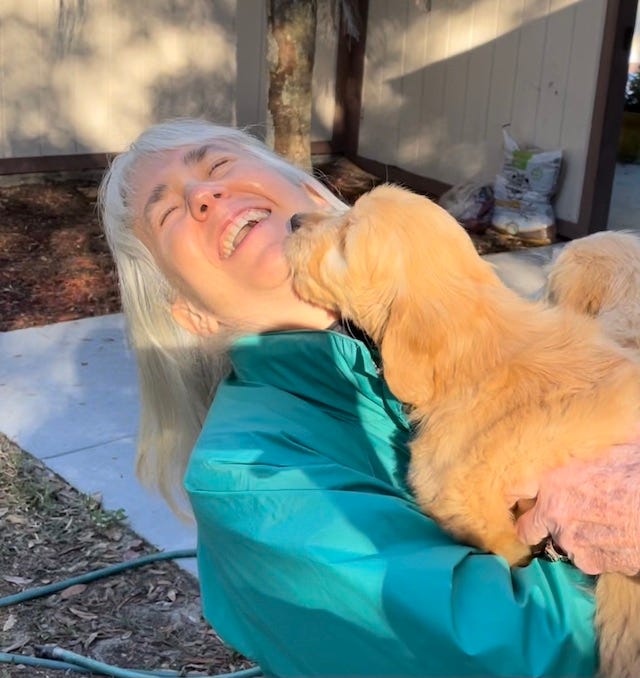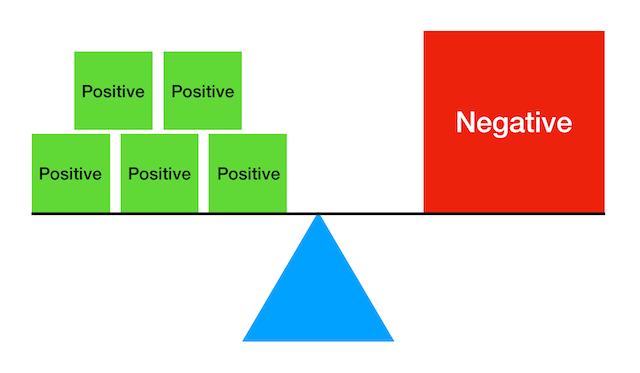The magic 5 to 1 ratio, don't sacrifice your relationship, and a puppy.
The Art and Science of Parenting #1
By: Catherine Lynch and Glenn Collins
Dear Awesome Parent,
This newsletter is where we talk about all things parenting: inspirational stories, what we've been reading, challenges parents are having, and opportunities to join us as we go deeper down the rabbit hole that is all things parenting.
If only our teens showed us as much love as this puppy does!
What we're thinking and talking about lately: The 5 to 1 relationship ratio.
John and Julie Gottman are a husband and wife team of researcher -psychologists who have spent decades figuring out what it takes to create a thriving romantic relationship. (Spoiler alert: the same principles apply to parents and kids, that’s why we’re so interested.) We recently listened to Dan Harris interview them on his (excellent) Ten Percent Happier podcast. Here’s the link.
One of their key findings is the magic 5:1 relationship ratio. Their research shows that couples need to have at least 5 positive interactions for every 1 negative interaction in order for their relationship to flourish and not end in divorce. This is due to “negativity bias”, a fancy phrase meaning we pay much more attention to negative events than positive ones. While the Gottman’s research focuses primarily on the relationship between romantic partners, the same general principles apply to parent-child relationships.
We know this: when there aren't enough positive interactions to balance out the negative interactions, the relationship between parents and their children deteriorate. In couples this leads to divorce, and in the parent/child relationship it leads to disconnection and dysfunction, which is the opposite of what we all want: happy, healthy, thriving kids.
Let’s face it, conflict with your kids is inevitable, especially with setting limits and saying No. There are just so many opportunities for negative interactions! The trick, of course, is to minimize the number and severity of the negative interactions, while at the same time having lots and lots of positive ones.
Here’s the important part: it takes at least 5 positive interactions to counterbalance each negative interaction. So, decreasing the number of negative interactions really gives you the biggest bang for your buck. That’s tough though, because kids keep testing the limits! One of the Gottman’s recommendations for achieving the 5:1 ratio is what they call a “small things often” approach to positive interactions. This means you’re always making lots of small positive deposits to their emotional bank account.
To continue with the banking analogy: you need to make all of these small deposits regularly to build up the account, so that when you do make the inevitable withdraw (negative interaction), your bank account doesn’t go into the red. And neither does your relationship!
Want to start making small deposits today?
Here are some easy ways to have more positive interactions today:
Be friendly - smile and greet them by name when you see them.
Be curious - ask questions about their favorite sport, influencer or hobby, and be interested in the answer.
Be appreciative - write a note recognizing something specific about them or something they’ve done and leave it where they’ll find it.
Reminisce about a good time you had together.
Send a cheerful text or gif.
Invite them to play a favorite game with you.
Tell a joke or make a funny face.
Here’s how to have fewer negative interactions:
Show empathy.
Pick your battles.
Don’t micromanage.
Avoid blame and shame.
Listen without interrupting.
Use your non-judgmental voice.
Don’t lose your cool - take a break when you need one.
Denounce the behavior, not the person or their character
Don’t Sacrifice Your Relationship
A mom in our Parenting Mastermind told this story recently about how conflict over thank you cards almost wrecked her last summer with her son before he left for college. Her son had graduated from high school and gotten gifts from family and friends. She wanted him to send thank you cards because that was the way she was raised: If you got a gift from someone, you sent them a thank you card.
Her son was slow to send the cards, so she was on his case. Demanding, Pleading, Cajoling. She tried everything to get him to send the cards. “It got to the point where it was damaging our relationship and he started avoiding me."
"I decided I wasn’t going to sacrifice our relationship just to make him write thank you notes. My S.O. said 'He’s not going to do it. Let it go.' So I did. If there were repercussions, such as him not getting gifts in the future or people thinking he was ungrateful, that would be on him, not on me.” She noted that parents are often judged by how their kids act, but decided she wasn’t going to let that dictate how she parented. This led to a conversation in the mastermind about just how hard it can be to let go of things that are important to us - but we have to in order to stay true to our higher priorities. In this case, her higher priority was maintaining a positive relationship with her adult son, instead of insisting that he conform to the thank you note writing etiquette she was raised with.




